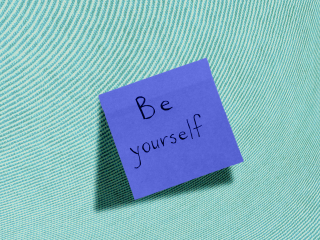11 Conversation Starters That Will Instantly Cure Any Social Awkwardness
It’s time to level up your small talk.
Have you ever found yourself in a conversation, palms sweating, itching for something (anything!) to say that isn’t about the weather? Or maybe you want to get to know someone more but worry about getting too real too fast and making them super uncomfortable? Everyone feels socially awkward sometimes. And while we can’t promise you won’t ever say the wrong thing, being armed with some solid ice breaker questions can make your next social gathering a lot less scary.
Heads up: Feeling absolutely panicked at the idea of socializing with a group of strangers or even making casual chit chat with colleagues might be a sign of social anxiety. So if this is something you deal with often and it’s kind of ruining your life, it’s worth bringing up to a therapist or health care provider to learn better ways of managing it than holing up in your room.
But not everyone who feels socially awkward or sucks at small talk is dealing with social anxiety. You might be shy, introverted, or extra self-conscious. Maybe this just wasn’t a skill you picked up on as a kid, says licensed therapist Lana Lipe, LCSW. For instance, if your parents were yappers who dominated every conversation, you might not have learned how to confidently engage with others, leaving you to feel unprepared and anxious in social settings today. And then there’s the way the prolonged pandemic shutdown and isolation left many people feeling even more awkward, disconnected, and out of practice when it comes to socializing, she adds.
Wherever you are on the socially-awkward-at-parties spectrum, having some good conversation starters in your back pocket can help you feel a little more prepared. We asked therapists for their favorite ice breakers that go beyond “what’d you do this weekend” without getting weird. Feel free to steal these for your next social gathering:
1. What’s the best trip you have ever taken?
"Instead of sticking to the same old surface-level questions, why not try something a bit more profound? Most people are OK with talking about themselves, so asking about someone's passions or memorable experiences can really kick start the conversation and even put them in a happier, more relaxed mood. This is helpful because it’s easier to engage with people who seem glad to be talking to you and are enjoying the conversation, in addition to creating a space for connection." —licensed clinical social worker Dolly Ferraiuolo, LCSW
2. What do you think about _____?
“For the start-up or surface-level interactions, easy ‘ins’ can be about the environment you’re in. If it’s a restaurant, bar, or something like a sporting event, ask the person how they feel about it. Try: ‘How do you feel about the [insert sports team here] this season?’ or ‘What’s your favorite thing to order at [insert restaurant or bar name here].’ These questions provide an opening to a conversation that can easily lead to learning more about someone else’s personality.” —licensed mental health counselor Hallie Kritsas, LMHC
3. Why did you decide to pursue _____?
“To get to know someone beyond small talk, combine ‘what’ questions about facts with ‘why’ questions that reveal someone’s motivations and values. For example, after asking ‘what’s your job?’ follow up with, ‘Why did you choose that career?’ ‘What’ gets the basics, while ‘why’ uncovers their underlying emotions and allows you to truly know them better.” —licensed therapist Lana Lipe, LCSW
4. What’s something you’re super into these days?
“Asking open-ended questions about the other person's interests or experiences invites them to share something they care about, making them feel appreciated and recognized. This approach encourages meaningful conversation and helps create a positive and engaging interaction.” —psychotherapist Prerna Menon, LCSW
5. What's been the highlight of your week?
“To move past surface-level small talk and begin to build relationships, ask questions that do not simply have a ‘yes’ or ‘no’ answer. This shows you're genuinely interested in learning about the other person, and it allows the conversation to progress naturally based on the response. These types of questions encourage the person to share more, leaving you feeling less awkward because you don’t need to scramble for the next thing to talk about right away.” —Lana Lipe, LCSW
6. I like your _____. Where’d you get it?
“If you struggle with social anxiety, complimenting someone can be an effective conversation starter because it demonstrates interest and appreciation, which helps establish a positive connection. Additionally, receiving a genuine compliment can boost the other person's confidence and encourage them to reciprocate, which makes for a more comfortable and balanced conversation.” —psychotherapist Marin Lebowitz, LMSW
7. Where did you grow up?
“If you show curiosity about other people and engage on your terms by posing thoughtful questions (like about someone's background), the anxiety that you feel in social situations will come down about five or six rungs on the ladder because the focus is on the other person, instead of you. While inside you might be dying of embarrassment, being assertive in conversations can help interactions move organically, as opposed to a more passive approach of waiting for someone to talk to you first.” —psychotherapist John Tsilimparis, MFT
8. What brings you joy lately?
“This is a great way to build rapport because people typically enjoy discussing things they love and appreciate. It also empowers you with a sense of control over the topic of conversation and can be comforting if you prefer when others do most of the talking.” —licensed social worker Pia Hargrove, LMSW
9. How do you usually unwind after a stressful day?
“Asking questions rooted in how someone feels while actively listening to why they feel that way can make both conversation participants feel more comfortable. For this question in particular, try introducing it with your own anecdote like, ‘So I've been trying to find a better way to unwind at the end of the day instead of just staring at my wall or TV until bedtime.’ This approach not only provides context for the question but also invites the other person to share their experiences and suggestions, creating room for both parties to feel seen.” —licensed mental health counselor Hallie Kritsas, LMHC
10. What are your highest hopes or deepest fears?
“While not everyone is going to want to answer this question as it is deeper than other small talk you will find out there, it does create conversation because of the potential jarringness of it. If people are open to talking about spirituality, this question is a great way to gain insight into someone's core values and beliefs.” —psychotherapist John Tsilimparis, MFT
11. I feel awkward. You?
“It can be really useful to address the obvious. Saying something like, ‘I feel awkward. I haven't left the house in two weeks. How are you feeling?’ is a great way to break the ice when you are uncomfortable. We all hate silence. It's intolerable for us for some reason. So saying something like that can really help in those situations. You could even make a joke about it as a way to lighten the mood and help people come together.” —licensed clinical psychologist Jaime Zuckerman, PsyD
Quotes have been edited and condensed for length and clarity.
Wondermind does not provide medical advice, diagnosis, or treatment. Any information published on this website or by this brand is not intended as a replacement for medical advice. Always consult a qualified health or mental health professional with any questions or concerns about your mental health.




